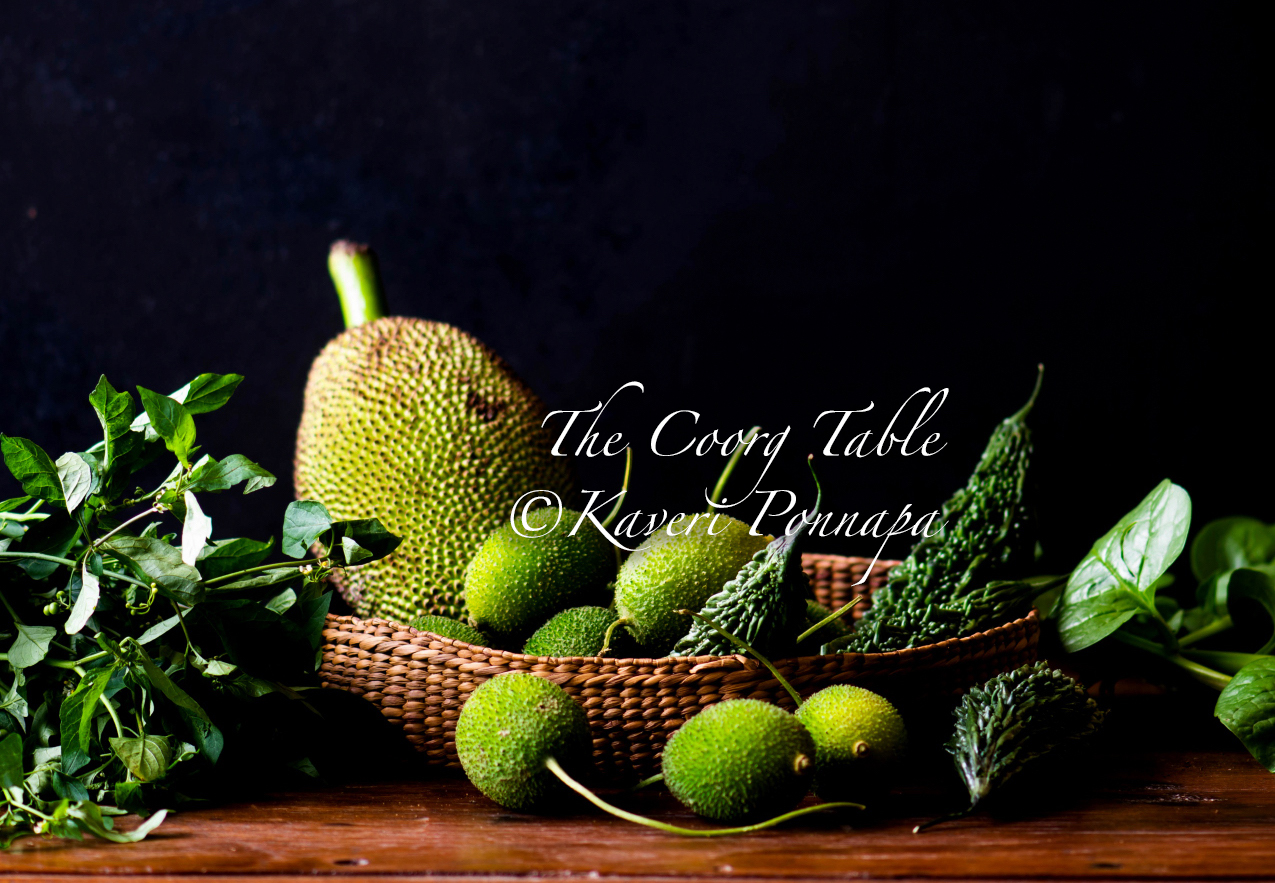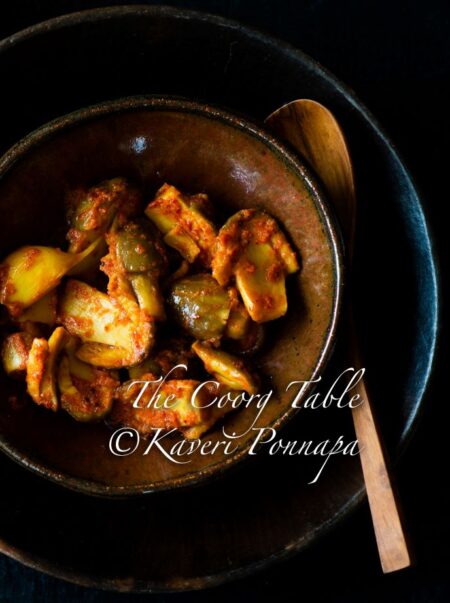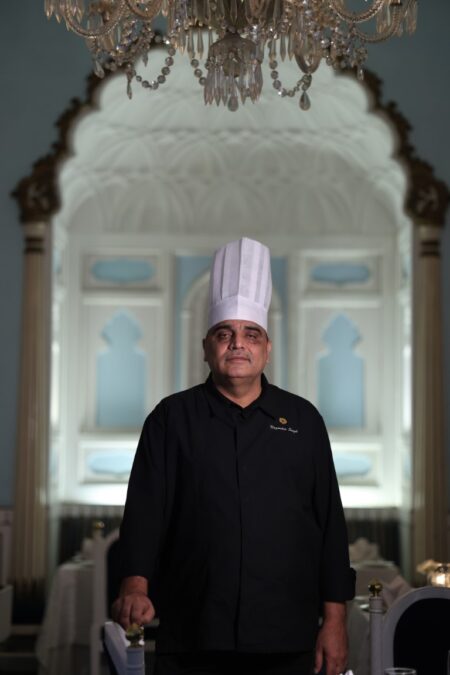The Coorg Table® is a palimpsest of grandmothers, mothers, aunts, in-laws, cousins and friends, who have created unforgettable meals and heirloom recipes, and cooked with love and generosity for anyone who sat at their table. These recipes, gathered over 25 years of sampling in kitchens, at dining tables, through letters, at homes in remote villages, exchanges at festivals, weddings and, at ain manes, the traditional homes of Coorg clans, distill onto a plate the varied and luscious seasonal bounty of the Coorg landscape.
The cuisine of Coorg evolved over the centuries, drawn from the generosity of the fertile landscape – tender wild greens, ferns, bamboo shoots, mushrooms, colocasia; forests full of flavourful wild game and birds, fields and kitchen gardens carefully tended by the people who were warriors, hunters and farmers, mostly in that order. Rice, grown in deep green valleys and the terraced fields of the higher slopes, was the queen of the table. It made its way to the table in unique versions at each meal, combined with delectable curries, fries and chutneys. Wild berries and fruit were gathered in season, and pickling and preserving were, and still are, popular. The rhythms of the seasons shaped the cuisine – selections of dried and smoked meats and preserved vegetables shored up the bleak monsoon months, when hunting was impossible, with the labour intensive, transplanting season underway in the fields. Every part of the year presented its special delights with a flourish, and the Coorg table® was always set with a lavish and exciting range of dishes.
The predominant flavour underlying this unique cuisine is ‘sourness’, either from the dark, viscous vinegar made from the fermented and boiled fruits of Garcinia gummi gutta, or from squeezes of ‘native’ limes, or else the much loved kaipuli – local bitter oranges. Invariably, many dishes contain an accent of one of these ingredients.
Traditionally, spices were ground in stone mortars and pestles, and grinding stones, and food was cooked in wide mouthed, red, earthenware pots, known simply as ‘curry-chattis‘, which retained the flavour of the food perfectly. In addition, there were brass and copper vessels of all shapes and sizes. A whole range of foods was steamed in copper steamers known as ‘sakalas‘. The wood fired kitchen was a smoky place, where dried meat hung from the rafters, gathering a wonderful flavour of their own.
Coorg women earned a well-deserved reputation for managing large, extended families and being extraordinarily good cooks, their generous hospitality extending easily to strangers. Many of them now manage coffee estates in isolated locations, and maintain excellent tables based on the seasonal riches of the landscape. The Coorg Table® is a tribute to the beautiful, capable and resolute women of Coorg, who always have room for one more at their table, and who have earned us our unmatched reputation for hospitality.
Every one of these recipes is dense with personal memories of the deep pleasures of food shared, laughter, and the personalities of the people who shared them with me and, can summon up the past, or an occasion, with just a whiff of roasting spices or, an entire season, with a vessel of fermenting bamboo shoots or a basketful of freshly gathered wild mushrooms – which is what I hope they will do for you. Some of you who have followed the blog for a while may wonder why i changed the name – The Coorg Table® sounded more suitable for our rustic and practical kind of cooking, although I have to add that there is plenty for a gourmet on our tables!
Image Credits: Nithin Sagi





Hello kaveri
I am food enthusiast and want to try out all heirloom recipes. I had been to Coorg and wanting to know about the recipes of Coorg . Can you please guide me how to look for your recipes
Thank you so much 😊
Hello Smita, thank you for your interest—the recipes that were posted on this website are now going to be in my cookbook on Kodava food. Do look out for it, I will post here when it is out. I am sure you will enjoy them. Best wishes. Kaveri
Dear ma’am,
It’s was really beautiful article. This evening my mother had told me about your blog and insisted me to read because you have a wonderful vocabulary. Now I know what she was talking about. Hope I could meet you in person sometime cause you really are an inspiration to me.
Hello Akshara, thank you very much for writing, and I’m so glad that you enjoyed the post. Please keep reading. I am sure we will meet sometime. Warm wishes. Kaveri
Hello!
I miss reading and trying out your recipes! I’ve been an avid follower of your recipes. Have tried the Pandi curry, the prawn curry, njendu curry, Onak erachi, Kaima unde barthad. 🙂 Let me know when the recipe book would be out. Can’t wait to try more of recipes that are always told with wonderful anecdotes and heart warming stories. 🙂 I’ve read and loved, ‘The Vanishing Kodavas’.
Much love to you,
Saroja Shiv Mandapa.
Hello Saroja, what a pleasure to hear how from you! Thank you for sharing how much you have enjoyed the blog, the stories and recipes posted on these pages. It means a lot to me. The Vanishing Kodavas was a labour of love, and I am always happy when people write in to say that they have read it. Many young people also write to say how they are using the book to go to festivals they had never heard of, observe, take pictures and learn more about our culture. If it has inspired another generation, then every bit of the effort was worth it. Do keep reading, I will post on this page from time to time, as the cookbook has a life of its own, I will never quite know when it will be done. Warm wishes.Kaveri
Thanks Kaveri for the authentic & delicious recipes👍 Very happy that I don’t have to bug people for some classic traditional recipes. 😎
Hello Zarine, thanks very much for writing in. I’m very glad to hear that you’ve been enjoying the recipes. It’s always a pleasure to share good food, and these recipes deserve to be preserved in as many kitchens as possible. And about asking people for recipes, I understand perfectly-it has taken many years of trial and error to refine and translate these recipes into ones that everyone can follow easily, and also persuade people to part with recipes that have been family secrets for generations. Good luck with the cooking, and keep visiting these pages. Best.Kaveri
Kaveri Ma’am greetings. A very odd question here. Am looking for a stone mortar pestle as used in traditional coorg cooking. Please please how can I get one? Am from & in Delhi. Regards.
Hi Prakash, thanks for getting in touch, I really appreciate your enthusiasm about the stone mortar and pestle- I have to say that it’s worth every bit of the effort using it, the spice pastes turn out so much better, and so also the taste of the food.I’m very sorry, but I have no idea where these are available in Delhi- perhaps Chandini Chowk? Or areas where you have stores that sell products for Tamilian cooking? The stones we use are common to most south Indian cooking. You can buy the flat stone (sil batta) and stone, which will work for most of your requirements.I have also seen some supplies online, but it is best to see the product before buying, and make sure that the stone is not powdery, and does not rub off into the food. Good luck, and I hope you find a supplier! Kaveri
What a lovely article. It reminded me of my dear friend who happens to be from Coorg, and I just relived the whole experience of the story she told me about how her uncles and relatives use to go hunting and their encounter with wild elephants marching towards them and their homes, just gave me goosebumps. I would appreciate if you would post some traditional recipes.
Hello, thank you for writing in, I’m so glad you enjoyed the post. Do have a look at the rest of the blog (you just have to click on The Coorg Table tab on the left of this page) there are already many traditional Coorg recipes posted, including pandi curry,koli curry, kumme curry and so on. These are tried and tested heirloom recipes, I’m sure you’ll have a wonderful time trying them out. Best wishes. Kaveri
Thank you very much Ma’m in displaying how food can shape our livelihood and what I like the most is that the way you have described is something we very rarely see from individuals and I hope I get a chance to taste your dishes.
Regards
Vishnu
Hello Vishnu, how nice to hear from you! Thank you for writing in, I’m so glad you enjoyed the blog. I love to share good food, and I,too, hope that you will get to taste some of my favourite dishes. Do keep visiting these pages. Best wishes. Kaveri
Hi Kaveri,
I simply love your blog and have been trying my hand at your recipes. I came to Kutta two years ago, fell in love with the place and bought a small plantation there, leaving my city of Delhi where I grew up. Your pictures are super and absolutely enticing. Would love to meet you some day soon and hear more stories from you. I am sure you have some connections near Kutta so do come over to Turtle Pond, Manchalli and be our guest .
Hello Meena, welcome to The Coorg Table. It’s wonderful to hear that you enjoy the recipes and stories, do look out for a consolidated version in the nearish (!) future. Apart from my family recipes,there are many special dishes that people have shared very generously, and that’s one part of the blog that I personally enjoy very much.Thank you for your kind invitation, and yes, if I happen to be around Kutta, I will certainly drop by. Warm wishes. Kaveri.
Hi once again,
Just discovered you studied at LSR. Which batch are you? I studied there too!
Hi Meena, that’s wonderful! Do mail me: kaverikamb@gmail.com.
Hello Rahul, thanks very much for writing in,I’m really happy you like the blog and pictures. I love cooking and writing about the food, and it’s great to share the results with other people. Enjoy the recipes, they are all tried, tested and much loved. I look forward to seeing you more often on these pages and on our Facebook page too. Warm wishes, Kaveri
Kaveri, I am a Coorg too and have been reading through. It is a very well put together blog. And I love your food styling. I cook a fair bit, so I am going to dip into your repertoire soon. I have to go through the book as well before I buy it. Have seen at Variety Book Store on Church Street.
And what a fabulous table this is. Love your space, the recipes, the stories and the pictures.
Hello! Thanks so much for visiting, I’m delighted that you like the page, and all that The Coorg Table has on it. Please drop by often, there will always be something new. Would love to have your responses to all that will be added soon.Best wishes, Kaveri.
And what a beautiful space it is. Love the stories, the recipes and the pictures.
A fabulous table ..so Ethnic&authentic & Inviting in its presentation &stories shared
as for the Recipes -they sound yummy &divine…having enjoyed a trip or two to
Coorg (having known several lovely Coorgis/or is it Kodavas? do correct) & being fascinated by the people- folklore&. culture of these beautiful..natural
environs ..I for one truly appreciate &value these Writings ..to be honest
Love your Website So elegant & warmly Inviting!
Welcome to The Coorg Table, Uma,I’m delighted that you like the site and posts. To answer your question, we are known as Kodavas and Kodavathis. Please do keep visiting the page, and try out the recipes too, they are all delicious! Warm wishes, Kaveri.